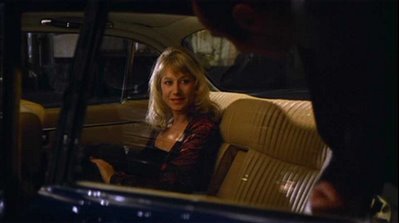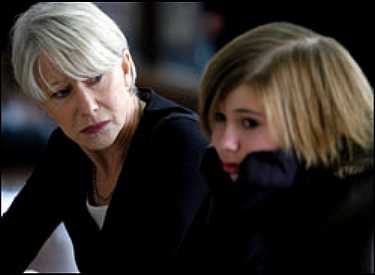 Helen Mirren, looking luscious in John Mackenzie's British crime classic THE LONG GOOD FRIDAY (1979) -- now available from Anchor Bay Entertainment.
Helen Mirren, looking luscious in John Mackenzie's British crime classic THE LONG GOOD FRIDAY (1979) -- now available from Anchor Bay Entertainment.It was after O LUCKY MAN! that I got around to some of her earlier performances: the popcorn-dropping moment in Ken Russell's SAVAGE MESSIAH (1972) when she walks down a palatial flight of stairs resplendently nude in heels, and Michael Powell's final feature AGE OF CONSENT (1969) in which she again (to quote Powell himself) "stripped off magnificently." I don't mean to focus exclusively on Ms. Mirren's physical disclosures, but they need mentioning in any attempt to explain the full shock of her early screen appearances. Not only was she arguably the most ravishing creature of her era, but she gave altogether extraordinary performances in movies that reflected unusual intelligence and discernment in their selection... and then, when the credits rolled, came the triple whammy of seeing that this voluptuous firebrand had appeared in these movies by arrangement with the Royal Shakespeare Company.
The years have passed remarkably for her, encompassing Tinto Brass' notorious CALIGULA (1979, which reteamed her with McDowell), THE LONG GOOD FRIDAY (1979, now available in a deluxe edition from Anchor Bay including an excellent making-of featurette interviewing all the principles, including Mirren), EXCALIBUR (1981), 2010: THE YEAR WE MAKE CONTACT (1984), and Peter Greenaway's THE COOK THE THIEF HIS WIFE AND HER LOVER (1989). In 1991, she accepted the lead role of District Chief Inspector Jane Tennison in a British TV movie called PRIME SUSPECT, which unexpectedly became one of the key roles of her distinguished career. She would reprise the role another half dozen times in the following 15 years, and her seventh (and reportedly final) performance in the role -- in PRIME SUSPECT: THE FINAL ACT -- airs tonight (and wraps up next week) on PBS' MASTERPIECE THEATER at 9:00pm.
Having matured into what Sean Burns has aptly termed "a foxy old bird," Mirren gives a performance in this two-parter that is one of her most unflinching and deeply felt, and it appears in the wake of her extraordinary work in the unrelated but serendipitous royal diptych of Tom Hooper's ELIZABETH I (aired on HBO) and Stephen Frears' THE QUEEN (2005, now in US theatrical release), making this a moment in her career that she's unlikely to top -- but perhaps that's more to do with my limitations of imagination than hers. On the basis of these three performances, we might as well declare this her year -- the former British ambassadrix of dramatic audacity and risqué risk-taking somehow reaching the pinnacle of her career by playing three of the most painfully zipped-up women you're likely to find fascinating.
The new PRIME SUSPECT reintroduces Jane Tennison at a difficult time: one month away from retirement and the pensioned life, she's taken to the bottle for companionship in her middle age, and at the point where she can no longer hide the fact from her co-workers (and ever her suspects) that she's become a blackout-prone alcoholic. Her job under threat, her career in the balance, her emotions shrieking but utterly sublimated, her only path to redemption is by solving one last case: the disappearance of 14 year-old girl Sallie Sturdy (Maxine Barton), which escalates to murder when she is found dead... and pregnant. The often harrowing investigation becomes unusually personal as DCI Tennison befriends one of Sallie's friends (Penny Philips, very well played by young Laura Greenwood) and possibly betrays that trust while under the influence. Making a tentative visit to an Alcoholics Anonymous meetings, she also encounters her former adversary Bill Otley (a fragile-looking Tom Bell in his final role), who -- in a poignant turnabout for their relationship -- helps to see her through the devastating news that her father (Frank Finlay) has been diagonosed with a very quick and inoperable cancer.

Helen Mirren befriends troubled teen Laura Greenwood in PRIME SUSPECT: THE FINAL ACT, airing tonight on PBS.
The first PRIME SUSPECT involvement by both director Phillip Martin and screenwriter Frank Deasy, THE FINAL ACT is not the series' most intense or surprising episode, but it is certainly its most poignant and dramatically complex, and perhaps its most deeply satisfying. Not only is it the most captivating dramatic television I've seen all year -- it eclipses ELIZABETH I in that respect -- but its strong performances (special kudos to Gary Lewis and Katy Murphy as the dead girl's parents), involving direction, and sensitive writing place it at equal standing with the best theatrical features I've seen this year; I'll be including it tandem with the more subtly remarkable THE QUEEN (to which it allies itself with the instantaneously classic line "Don't call me 'Ma'am,' I'm not the bloody queen") on my year's best list. The first part includes a terrific action scene, a chase down the side of a multi-story apartment building, and next Sunday's conclusion includes a startling compression of narrative action into a staccato howl of despair that trusts us to fill in the details. One gets the feeling it came about with the director and editor (Trevor Waite) having their backs in the corner, time-wise, but they fought their way out of that corner brilliantly.
How well PRIME SUSPECT: THE FINAL ACT will adapt to PBS standards remains to be seen. In its original UK broadcast version, the show contained some very strong language that many PBS affiliates may not want to risk, lest they get slapped with heavy FCC fines. (Isn't that an ironic acronym for a company that forbids obscene language?) I recommend you watch it anyway, and fill in the FCC-ing blanks at your own discretion.
Not all great series have the benefit of a great ending, but PRIME SUSPECT has given one of contemporary detective drama's great heroines an impressive farewell. Such is the quality of Helen Mirren's valedictory performance in the role that one doesn't feel the least bit disappointed that this is the end of Jane Tennison's story.
Because it's been a good story well and fully told, and because Helen Mirren's own story is fabulously ongoing.